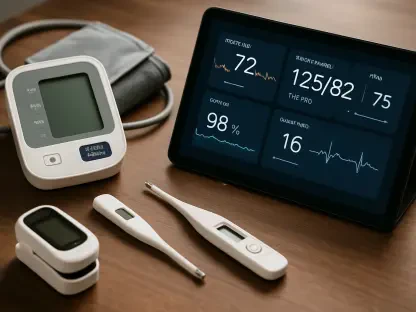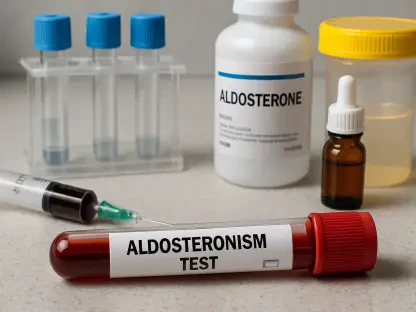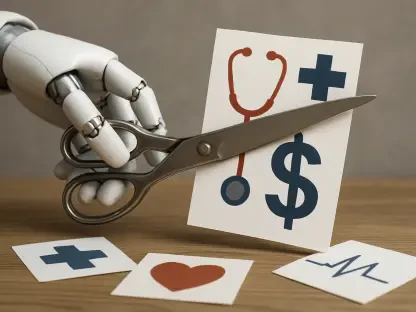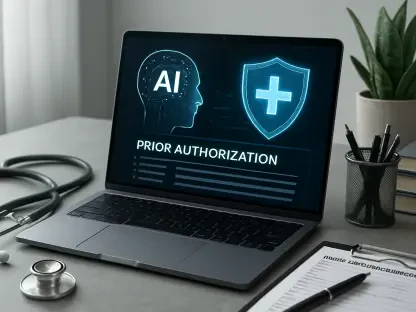Natural Language Processing (NLP), a sophisticated domain within artificial intelligence, is poised to revolutionize the healthcare sector. By understanding, interpreting, and responding to human language, NLP technology can transform unstructured clinical data into structured formats, enhancing operational efficiencies and diagnostic accuracy. Between now and 2033, the healthcare industry is expected to see significant growth in the adoption of NLP technologies, driven by various market dynamics. As healthcare providers navigate complex data landscapes, NLP’s ability to streamline clinical documentation and provide actionable insights will be increasingly vital.
Expansion and Growth in the NLP Healthcare Market
The projected growth of NLP in healthcare is a reflection of both technological evolution and the pressing need for improved healthcare solutions. From an estimated value of USD 3.51 billion in 2024, the market is anticipated to soar to USD 47.37 billion by 2033, indicating a compound annual growth rate of 33.52%. Such figures underline a robust demand for AI-driven solutions to tackle contemporary healthcare challenges. Economically, the integration of NLP could reduce operational costs by automating labor-intensive processes, ultimately enabling healthcare systems to reallocate resources for enhanced patient care. North America is leading this expansion, particularly the United States, thanks to advanced healthcare infrastructures and a comprehensive embrace of electronic health records. Investments in AI technologies for clinical applications have further solidified the region’s position as a frontrunner in adopting NLP solutions.
Technological Integration and Impacts
NLP technology’s ability to transform unstructured clinical data into usable formats has profound implications for healthcare operations. By converting spoken information and handwritten notes into digital records, NLP dramatically increases healthcare data accuracy and accessibility. This capability directly correlates with improved diagnostic precision, allowing practitioners to access comprehensive patient histories. Successful NLP integration has already been observed in several healthcare systems. These include applications that automate documentation, analyze patient interactions, and predict potential health issues. The resultant efficiencies not only streamline healthcare operations but also enhance patient engagement, as NLP-driven solutions can offer more personalized healthcare experiences. The integration of NLP with existing technologies promises to create a more cohesive healthcare environment, fostering advancements in both patient tracking systems and healthcare analytics.
Market Drivers
The demand for more efficient clinical documentation emerges as a pivotal driver of NLP market adoption. Healthcare providers face mounting administrative challenges that NLP technologies can alleviate by converting spoken or handwritten information into electronic records swiftly and accurately. Additionally, the pharmaceutical industry’s focus on leveraging real-world evidence is propelling the integration of NLP technologies. By extracting relevant data from diverse clinical sources, NLP aids in shaping research outcomes and regulatory submissions, ultimately informing patient care strategies more precisely. Furthermore, substantial investments in AI-driven clinical solutions showcase a growing reliance on NLP technologies to meet varied healthcare needs. These investments signal the industry’s confidence in AI’s ability to address healthcare inefficiencies and to usher in improved operational methodologies.
Challenges and Restraints
Despite promising growth, NLP’s integration into healthcare is not without challenges. Compliance with stringent data privacy regulations such as HIPAA in the United States and GDPR in Europe can impede widespread adoption, as healthcare providers navigate complex legal landscapes to protect patient information. Another significant restraint is the high cost associated with implementing NLP technologies, which can be prohibitive, particularly for smaller healthcare enterprises. Additionally, the skills gap poses a challenge; a shortage of professionals with dual expertise in healthcare and artificial intelligence can hinder the successful deployment of NLP systems. This gap underscores the need for targeted education and training programs to equip the workforce with necessary skills to manage and implement AI technologies effectively within healthcare settings.
Opportunities for Innovation
Within the realm of healthcare, NLP’s integration with precision medicine initiatives represents a significant opportunity for innovation. By analyzing vast amounts of unstructured data, NLP can facilitate the development of personalized treatment plans tailored to individual patient needs. Furthermore, there is growing potential for multilingual NLP applications in global clinical trials, which are increasingly required to process data from diverse geographic regions efficiently. Different sectors within the healthcare industry stand to benefit immensely from NLP advancements, including diagnostics, patient monitoring, and predictive analytics. Ensuring seamless data communication across platforms will empower healthcare providers to deliver more responsive and targeted care strategies, elevating patient care levels to new standards.
Overcoming Technical Challenges
The path to full NLP integration within healthcare is marked by technical hurdles that require innovative solutions. Accurate contextual understanding and resolving domain-specific ambiguities remain crucial issues affecting the fidelity of NLP applications in clinical settings. Moreover, interoperability and standardization gaps across healthcare systems pose significant challenges, limiting the seamless integration of NLP technologies across various platforms. Addressing these concerns necessitates a concerted effort to develop standardized protocols and innovative approaches. Collaboration among tech companies, healthcare providers, and regulatory bodies can lead to pioneering solutions that ensure consistent data handling and interpretation across different healthcare landscapes.
Key Industry Players
The competitive landscape of NLP in healthcare is vibrant, with major industry players such as IBM, Microsoft, Amazon, and Google investing heavily in the development of advanced NLP solutions. These organizations are not only driving innovation but also setting benchmarks for strategic collaborations in the market. Through partnerships with healthcare providers, they are refining NLP technologies to better meet the unique needs of the medical field. This collaborative approach fosters an ecosystem that supports rapid advancements and integration of NLP into healthcare processes. By leveraging their extensive technological expertise, these companies play a pivotal role in shaping a future where NLP becomes integral to the everyday operations of healthcare systems.
Future Developments
Natural Language Processing (NLP), a cutting-edge sector within artificial intelligence, is set to bring about transformative changes in the healthcare industry. By enabling the comprehension, analysis, and response to human language, NLP can convert unstructured clinical data into manageable and structured formats. This conversion can significantly boost operational efficiency and improve the accuracy of diagnostics. As we move toward 2033, the healthcare sector is predicted to witness substantial growth in the use of NLP technologies, influenced by a variety of market dynamics. NLP offers a powerful tool for healthcare providers as they deal with increasingly complex data environments. By streamlining clinical documentation processes and providing valuable, actionable insights, NLP technology will become crucial in helping medical professionals make informed decisions. This technology not only saves time in managing patient records but also supports better patient outcomes by facilitating quicker and more precise diagnoses. Furthermore, as healthcare systems continue to evolve, the integration of NLP technologies will likely become a key factor in enhancing patient care and reducing administrative burdens. The ability of NLP to process large volumes of data with speed and precision can lead to more personalized and effective treatment plans, benefiting both healthcare providers and patients alike.









